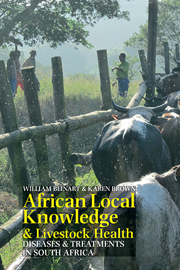Book contents
- Frontmatter
- Contents
- Acknowledgements
- Abbreviations
- Names of Common Diseases
- List of Maps, Photographs & Tables
- 1 Introduction: African Local Knowledge & Veterinary Pluralism
- 2 Ticks, Tick-borne Diseases & the Limits of Local Knowledge Introduction
- 3 ‘The Grave of the Cow is in the Stomach’: Environment & Nutrition in the Explanation & Prevention of Livestock Diseases
- 4 Transhumance, Animal Diseases & Environment
- 5 Plants & Drugs: Medicating Livestock
- 6 Medicinal Plants: Their Selection & their Properties
- 7 Animal Health & Ideas of the Supernatural
- 8 Gender, Space & the Supernatural
- 9 Conclusion
- Appendices
- Select Bibliography
- Index
5 - Plants & Drugs: Medicating Livestock
Published online by Cambridge University Press: 05 December 2013
- Frontmatter
- Contents
- Acknowledgements
- Abbreviations
- Names of Common Diseases
- List of Maps, Photographs & Tables
- 1 Introduction: African Local Knowledge & Veterinary Pluralism
- 2 Ticks, Tick-borne Diseases & the Limits of Local Knowledge Introduction
- 3 ‘The Grave of the Cow is in the Stomach’: Environment & Nutrition in the Explanation & Prevention of Livestock Diseases
- 4 Transhumance, Animal Diseases & Environment
- 5 Plants & Drugs: Medicating Livestock
- 6 Medicinal Plants: Their Selection & their Properties
- 7 Animal Health & Ideas of the Supernatural
- 8 Gender, Space & the Supernatural
- 9 Conclusion
- Appendices
- Select Bibliography
- Index
Summary
In the past there were no vaccines and animals were never identified as sick. Now animals are like children; they have to have injections and be cared for.
(Caroline Serename, Kgabalatsane, North West Province)Introduction: plants and biomedicines
Caroline Serename and her husband had farmed in Kgabalatsane (near Garankuwa) for over 30 years. Farming was a family business and as children they had been involved in looking after animals. She had worked as a domestic servant in Gauteng and her husband in factories. They had invested their savings, and now their pensions, in cattle. In November 2009 they owned about 36 Brahman cattle. They favoured Brahmans because they thought these were comparatively easy to handle and grew fast, being ready for market in about 18 months. Their main buyers were African customers who needed cows for ceremonies and funerals. The Serenames were committed to modern medicine. Caroline had a good biomedical knowledge of diseases. She knew ticks spread heartwater, insects propagated lumpy skin disease and that blackquarter was endemic in the area. She sprayed her animals against ticks twice per month and also injected them with parasiticides like Ivomec (ivermectin) to deal with worms as well as acarids. She vaccinated for blackquarter and anthrax and always had the antibiotic Terramycin (oxytetracycline) on hand in case her cattle fell sick. Caroline Serename was adamant: ‘if you love your livestock, like your children, then you have to invest in vaccines and antibiotics.’
- Type
- Chapter
- Information
- African Local Knowledge and Livestock HealthDiseases and Treatments in South Africa, pp. 137 - 162Publisher: Boydell & BrewerPrint publication year: 2013

